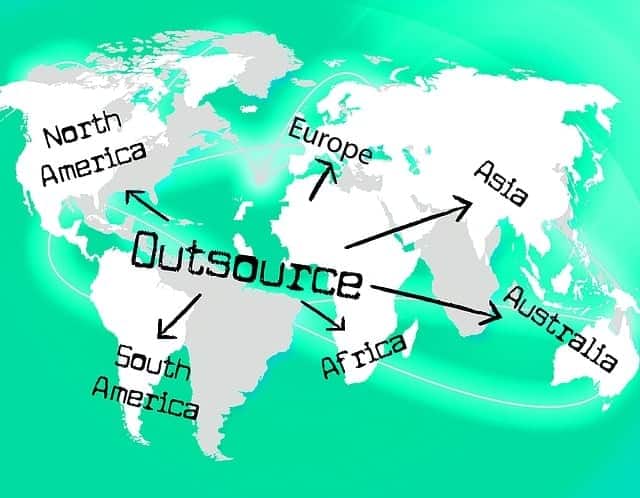- How Outsourcing Helps
- Economic Growth and Job Creation
- Development of Infrastructure
- Skill Development and Human Capital Enhancement
- Challenges and Considerations
In recent years, the global business landscape has witnessed a seismic shift as companies, from burgeoning startups to established conglomerates, have increasingly embraced outsourcing as a cornerstone strategy for growth and competitiveness. This burgeoning boom is not just a business trend; it’s a multifaceted economic phenomenon that has had profound implications. As the world leans into a new era of work, where geographical boundaries are becoming less relevant, these economies are finding themselves at the forefront of a transformative wave that promises to redefine their role in the global market.
The traditional narrative can be tinged with concerns over job losses and economic displacement for companies in developed economies. However, this perspective is only one side of the coin. For developing economies, the trend unfurls a tapestry of opportunities that can stimulate their economic engines. These opportunities manifest as increased foreign investment, technology transfer, and a wealth of jobs, driving an unprecedented spurt in their economic development.
Take a stroll through the bustling tech parks of Bangalore or the vibrant call centres of Manila, and you’ll witness firsthand the palpable energy of a workforce that has become the backbone of global services. It is this workforce that has turned outsourcing into a goldmine for developing economies, bringing in a diverse set of pros that extend beyond mere job creation. From the up skilling of the labour force to fostering a new generation of tech-savvy entrepreneurs who are increasingly plugging into global supply chains, the impact is monumental and multi-dimensional.
Outsourcing to the Philippines has become a significant trend, with the country emerging as a key destination for business processes due to substantial reductions in labor costs and the growth of its outsourcing industry.
What makes these economies such attractive destinations? Is it merely the cost-competitiveness, or is there more to the story? Clearly, the narrative has evolved, with factors like a young and educated workforce, improving infrastructure, and supportive government policies playing pivotal roles. The ability of these economies to provide quality services at a fraction of the cost without compromising on quality is a value proposition that’s hard to ignore for businesses looking to optimise their operations.
How Outsourcing Helps
Outsourcing is an integral economic lever, reshaping the prospects of developing economies. The historical progression, shifting trends, and destinations have all contributed to a complex economic phenomenon that underpins the contemporary global economy.
Outsourcing to the Philippines has played a crucial role in reshaping the economic prospects of the country, making it a popular choice for businesses seeking efficient virtual assistance and significant cost savings.
Origins and Growth
Outsourcing’s genesis can be traced back to the post-war era, where the combination of economic reform, international business expansion, and trade liberalisation led to the first waves of offshore manufacturing. How has it helped from this period? It kick-started an era of economic development, where foreign direct investment began to bolster local economies.
Key Trends Shaping Practices
As globalisation effects took hold, there was a noticeable evolution in economic strategy. Firms sought cost savings through skilled labour outsourcing, tapping into a global labour market with lower labor costs that was rapidly opening up. The international trade impact of this was significant; it spurred job creation, increased foreign investment, and broadened technology transfer, leading to technology growth in economies.
Shifts in Destinations and Labour Market Evolution in Developing Countries
Emerging markets have seen a dynamic shift in their role within the paradigm, highlighting the significance to various countries. Originally, destinations like India dominated the BPO sector. However, economic globalisation prompted a shift, with countries in Eastern Europe and Latin America emerging as viable alternatives, bringing diversification to the labour market evolution and destinations.
The shift to the Philippines as a major outsourcing destination has brought diversification to the labor market, with the country becoming integral to the global outsourcing industry.
Outsourcing serves as a powerful economic strategy for developing countries, enabling them to leverage their workforce for economic gain. The impact on the global economy has been magnified by the substantial foreign direct investment, facilitating not just job growth but also fostering economic stability and growth.
Impact of BPO on Economies
BPO has had a transformative effect on the economies that have embraced it. The impact of BPO is quantifiable, with clear benefits in developing countries such as heightened employment, improved service sectors, and enhanced foreign exchange earnings. Outsourcing to the Philippines has led to heightened employment and improved service sectors, making it a significant contributor to the country’s economic growth. These benefits are supported by data tables that highlight the economic impact of BPO in specific regions.
Cost Advantage and Economic Policy Reform
Cost savings on their core competencies are often the most immediate advantage recognised. The cost savings have motivated many emerging markets to implement economic policy reforms aimed at attracting more outsourcing business, which in turn has contributed to the wider economic reforms and successes. The cost savings associated with outsourcing to the Philippines have motivated the country to implement economic policy reforms aimed at attracting more outsourcing business.
The offshore business advantages are not limited to economic measures. They extend to substantial improvements in local education systems and technological capabilities. Technology transfer can be instrumental in upskilling the workforce, which is a critical factor in the developing countries.
The Benefits of Outsourcing and Global Trade
Globalisation of outsourcing trends have been closely linked, with cross-border activities expanding the reach of international economics. The global trade benefits have allowed developing nations to participate more actively in international markets, influencing trade liberalisation dynamics. Outsourcing to the Philippines has allowed the country to participate more actively in international markets, influencing trade liberalization dynamics.
By dissecting these facets it becomes evident how integral the practice has been in sculpting the economic destinies of developing and emerging markets. The intersection of foreign investment, economic growth, and strategic policy adaptation continues to make it a pivotal aspect of modern economics.
Addressing Social Issues
Outsourcing administration tasks to developing countries is not just about the bottom line. Companies also contribute to community stability and societal transformation in developing nations. Outsourcing to the Philippines has also contributed to community stability and societal transformation, with companies implementing various social responsibility initiatives. Many companies and stakeholders in these countries recognise the positive socio-economic impacts of outsourcing to places like India. Companies like Teleperformance, Telus, and Foundever (formerly Sykes) have implemented various social responsibility initiatives in the countries where they operate. These initiatives include promoting quality education and learning opportunities, donating to charities and organisations, and supporting community development projects.
Theoretical Perspectives
Outsourcing has become a popular competitive strategy for firms in various industries. Companies in developed countries are seeking opportunities offshore to survive in the domestic and international marketplaces. The economies of the world have become increasingly interdependent, and organisations have come under tremendous pressure to maximise productivity and profitability.
Economic Growth and Job Creation
In the nexus of global economic dynamics, outsourcing stands as a pivotal force driving the growth and transformation of developing economies. Examining the multifaceted impacts provides a comprehensive look into how it contributes to GDP growth, job creation, and the overall economic trajectory of nations.
Outsourcing to the Philippines has significantly contributed to the country’s GDP growth and job creation, making it a pivotal force in its economic trajectory.
A key measure of economic health, GDP, has seen notable increases in many emerging markets. This phenomenon underscores the direct correlation between outsourcing of services and manufacturing and the uptick in economic output. For instance, in India, the IT-BPO sector accounts for approximately 8% of the total GDP.
Case Studies: Economic Advancement
Several countries stand as testaments to the benefits of outsourcing. The Philippines, for example, has emerged as a BPO powerhouse, with the industry contributing over $26 billion to the economy in 2019, supporting around 1.3 million jobs. Similarly, Poland has capitalised on its skilled labour and cost advantages, attracting substantial FDI and becoming a hub for shared services in Europe.
Types of Jobs Created
The types of jobs spawned are diverse, ranging from manufacturing positions to high-skilled IT roles. The job creation effect is particularly pronounced in sectors such as customer service, finance, and technology. These jobs not only contribute to labour market evolution but also support economic strategy by diversifying the employment base and reducing dependency on traditional sectors.
Impact on Local Employment and Skilled Labor in Developed Economies
Outsourcing’s role in fostering skilled labour is noteworthy. Countries have developed targeted economic policies to enhance their workforce’s skills, aligning with the needs of international business. Outsourcing to the Philippines has played a crucial role in fostering skilled labor, with the country developing targeted economic policies to enhance its workforce’s skills. This strategic move has not only fostered job growth but also strengthened the domestic labour market’s resilience.
The relationship between outsourcing and international trade is symbiotic, with trade liberalisation often paving the way for increased activity. The global trade benefits are evident in the enhanced competitiveness of emerging markets, allowing them to become integral players in the global economy.
Development of Infrastructure
In the intricate tapestry of economic development, the role of outsourcing as a catalyst for infrastructural growth cannot be overstated. Infrastructural improvements are not merely byproducts of economic expansion; they are essential underpinnings that support and sustain it.
The surge in outsourcing to the Philippines has led to increased urban development and infrastructural improvements, supporting the demands of international companies.
Outsourcing and Infrastructural Projects: A Symbiotic Relationship
Consider India, where the boom in the IT sector has precipitated a massive enhancement in digital and physical infrastructure, from the establishment of technology parks to the expansion of fibre-optic networks. Similarly, the Philippines’ surge in BPO has led to increased urban development, focusing on building business districts equipped to handle the demands of international companies.
Long-Term Economic Benefits of Improved Infrastructure
The long-term benefits of such infrastructure are innumerable. They facilitate job creation, enhance the quality of skilled labour, promote trade liberalisation, and foster economic policy geared towards sustainable growth. The long-term benefits of infrastructural improvements driven by outsourcing to the Philippines include enhanced job creation, improved skilled labor, and sustainable economic growth. By laying the groundwork for more efficient, globally connected business operations, these improvements contribute to a positive cycle of economic growth and job creation.
Skill Development and Human Capital Enhancement
Outsourcing has been a pivotal force in fostering skill development and enhancing human capital in developing economies. Outsourcing to the Philippines has been pivotal in fostering skill development, with the country investing in educational infrastructure to meet the demands of the outsourcing industry. The burgeoning and other outsourced sectors have necessitated a paradigm shift in education and skill levels among the workforce of these economies.
Influence of Outsourcing on Education and Skill Levels
The demand for skilled labour in outsourcing hubs has catalysed significant foreign investment in educational infrastructure. For instance, in India, the growth of the IT outsourcing industry, particularly in software development, has led to a surge in specialised training centres and technical education institutions.
Upward Mobility and Middle-Class Expansion
Through job creation outsourcing, workers in these regions have experienced unprecedented upward mobility. The availability of jobs requiring diverse skill sets has led to the creation of a burgeoning middle class. Outsourcing to the Philippines has contributed to upward mobility and the expansion of the middle class, with the availability of diverse job opportunities.
Outsourcing has indisputably played a critical role in elevating the skill levels and educational standards in developing economies. It has fostered foreign partnerships, stimulated economic growth, and facilitated an environment conducive to sustained international trade and job creation. Through strategic economic policy and foreign direct investment, these regions have successfully harnessed the benefits of global outsourcing trends, leading to a robust and skilled workforce that promises continued economic vigour.
Challenges and Considerations
Outsourcing, while often celebrated for its economic benefits, comes with a complex set of challenges and considerations. Central to these is the need to balance the gains against potential drawbacks, addressing concerns such as economic dependency and labour exploitation.
Balancing Benefits and Downsides
While outsourcing has indeed stimulated job creation and economic growth in many developing economies, the flip side includes the creation of economic dependencies. This dependency on foreign investment can lead to volatility; a shift in global market trends or economic downturns in client countries can leave outsourced labour markets vulnerable.
Economic Dependency and Labour Exploitation Issues
Outsourcing is a way to engender economic dependency, particularly when emerging markets lean heavily on this single economic strategy. The labour market in these countries can become disproportionately tailored to the needs of international trade, leaving local economies at risk of shocks from global demand fluctuations. Labour exploitation, too, is a pressing concern, with reports of substandard working conditions and unfair wages in some outsourcing sectors, which can undermine the cost savings advantages.
Sustainable Outsourcing Practices
Sustainable outsourcing practices are vital for long-term benefits. This includes the adoption of fair labour practices and economic policies that protect workers’ rights and livelihoods. Foreign Direct Investment (FDI) and partnerships that allow companies the ability to outsource to places like India is a strategy that must be leveraged not only for immediate economic strategy but also for the transfer of technology and skills to local economies, ensuring that economic growth due to outsourcing is inclusive and equitable.
Outsourcing’s impact on global trade and the benefits it can bring to BPO and economies is significant, but the emphasis must remain on sustainable practices.
Conclusion
The outsourcing boom presents a dynamic tableau of opportunities. The influx of Business Process Outsourcing (BPO) and cross-border partnerships has played a pivotal role in the narrative of globalisation, bringing about substantial economic growth, job creation, and foreign investment. As businesses worldwide turn to outsourcing for its cost advantages, developing countries have found a fertile ground for nurturing economic strategy and labour market evolution.
The benefits are tangible: outsourcing catalyses job growth, with a significant number of positions being created in sectors like IT, customer service, and manufacturing. This, in turn, promotes the emergence of a middle class and fuels domestic spending and economic stability. Moreover, foreign direct investment in outsourcing becomes a conduit for technology transfer and skill development, enriching the human capital of these nations.
However, amidst the pros, it is essential to also consider the cons with strategic foresight. Developing economies must leverage this boom to drive sustainable economic reforms, ensuring that the growth is equitable and inclusive. While outsourcing benefits are evident, they must be weighed against the need for robust economic policy and safeguards against the volatility of international markets.
In the grand tapestry of international economics, being able to understand the impact of outsourcing as a more cost effective solution stands out as a thread interwoven with the potential for prosperity. The strategy lies not just in embracing outsourcing but in harnessing its full potential responsibly. By doing so, these nations can transform any boom into a sustained economic crescendo that resonates with the broader objectives of socio-economic development and global trade impact.
Developing economies stand at the crossroads of opportunity and challenge. The road ahead requires a balanced approach, ensuring that the boom in outsourcing translates into a lasting legacy of prosperity and progress.







